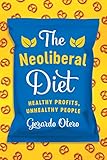The Neoliberal Diet : Healthy Profits, Unhealthy People / Gerardo Otero.
Material type: TextPublisher: Austin : University of Texas Press, [2021]Copyright date: ©2018Description: 1 online resource (256 p.)Content type:
TextPublisher: Austin : University of Texas Press, [2021]Copyright date: ©2018Description: 1 online resource (256 p.)Content type: - 9781477316993
- Food industry and trade -- Political aspects
- Food industry and trade -- Social aspects
- Food industry and trade
- Food preferences -- Economic aspects
- Food preferences
- Food supply -- Social aspects
- Food supply
- Globalization
- Neoliberalism
- Obesity -- Social aspects
- Obesity
- Produce trade -- Government policy
- Produce trade
- SOCIAL SCIENCE / General
- 338.1/9 23
- HD9000.5 .O867 2018
- HD9000.5 .O867 2018
- online - DeGruyter
| Item type | Current library | Call number | URL | Status | Notes | Barcode | |
|---|---|---|---|---|---|---|---|
 eBook
eBook
|
Biblioteca "Angelicum" Pont. Univ. S.Tommaso d'Aquino Nuvola online | online - DeGruyter (Browse shelf(Opens below)) | Online access | Not for loan (Accesso limitato) | Accesso per gli utenti autorizzati / Access for authorized users | (dgr)9781477316993 |
Browsing Biblioteca "Angelicum" Pont. Univ. S.Tommaso d'Aquino shelves, Shelving location: Nuvola online Close shelf browser (Hides shelf browser)

|

|

|

|

|

|

|
||
| online - DeGruyter Blues for Cannibals : The Notes from Underground / | online - DeGruyter Some of the Dead Are Still Breathing : Living in the Future / | online - DeGruyter On Story—The Golden Ages of Television / | online - DeGruyter The Neoliberal Diet : Healthy Profits, Unhealthy People / | online - DeGruyter The Television Code : Regulating the Screen to Safeguard the Industry / | online - DeGruyter Love, Sex, and Desire in Modern Egypt : Navigating the Margins of Respectability / | online - DeGruyter Breaking the Frames : Populism and Prestige in Comics Studies / |
Frontmatter -- Contents -- Tables and Figures -- Acknowledgments -- Introduction OBESITY AND THE NEOLIBERAL DIET -- CHAPTER 1 The Neoliberal Food Regime and Its Crisis THE DYNAMIC FACTORS -- CHAPTER 2 Neoregulation of Agricultural Biotechnology at the National and Suprastate Scales -- CHAPTER 3 Food and Inequality in the United States -- CHAPTER 4 Class Diets in the NAFTA Region DIVERGENCE OR CONVERGENCE? -- CHAPTER 5 NAFTA, Agriculture, and Work MEXICO’S LOSS OF FOOD AND LABOR SOVEREIGNTY -- CHAPTER 6 Globalizing the Neoliberal Diet FOOD SECURITY AND TRADE -- CHAPTER 7 Food Security, Obesity, and Inequality MEASURING THE RISK OF EXPOSURE TO THE NEOLIBERAL DIET -- Conclusion WHAT IS TO BE DONE? -- References -- Index
restricted access online access with authorization star
http://purl.org/coar/access_right/c_16ec
Why are people getting fatter in the United States and beyond? Mainstream explanations argue that people simply eat too much “energy-dense” food while exercising too little. By swapping the chips and sodas for fruits and vegetables and exercising more, the problem would be solved. By contrast, The Neoliberal Diet argues that increased obesity does not result merely from individual food and lifestyle choices. Since the 1980s, the neoliberal turn in policy and practice has promoted trade liberalization and retrenchment of the welfare regime, along with continued agricultural subsidies in rich countries. Neoliberal regulation has enabled agribusiness multinationals to thrive by selling highly processed foods loaded with refined flour and sugars—a diet that originated in the United States—as well as meat. Drawing on extensive empirical data, Gerardo Otero identifies the socioeconomic and political forces that created this diet, which has been exported around the globe, often at the expense of people’s health. Otero shows how state-level actions, particularly subsidies for big farms and agribusiness, have ensured the dominance of processed foods and made healthful fresh foods inaccessible to many. Comparing agrifood performance across several nations, including the NAFTA region, and correlating food access to class inequality, he convincingly demonstrates the structural character of food production and the effect of inequality on individual food choices. Resolving the global obesity crisis, Otero concludes, lies not in blaming individuals but in creating state-level programs to reduce inequality and make healthier food accessible to all.
Mode of access: Internet via World Wide Web.
In English.
Description based on online resource; title from PDF title page (publisher's Web site, viewed 26. Apr 2022)


